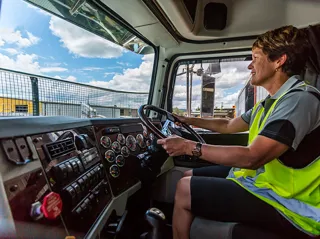Commercial fleet operators who overpaid for trucks from firms that colluded in a price-fixing cartel could receive a combined total of £5 billion in compensation.
In July 2016, DAF, Daimler (Mercedes-Benz), Iveco, MAN and Volvo/Renault all admitted to having participated in a 14-year illegal price-fixing cartel, between 1997 and 2011.
Scania initially denied any wrongdoing but, following an investigation by the European Commission, was also found to have participated in the cartel.
Collectively, the truck manufacturers were fined more than €3.8 billion (£3.4bn) – the largest ever penalty imposed by the European Commission in this type of case.
In its next step towards getting compensation for thousands of UK truck operators who paid over the odds for trucks, the Road Haulage Association (RHA) has now submitted its application to the Competition Appeal Tribunal to pursue its claim against the manufacturers.
If successful, the RHA says that UK operators could be reimbursed more than £6,000 for every vehicle of six tonnes and above they bought or leased between 1997 and 2011.
Operators are entitled to claim for the difference between what they paid for their trucks (new, second-hand or leased) and what they would have paid had the cartel not existed.
RHA chief executive Richard Burnett said: “We estimate the truck cartel will have impacted upon the buyers of 600,000 trucks that were bought in the UK between 1997 and 2011, amounting to a potential compensation claim of more than £5bn.
“On the same basis, we estimate operators in the rest of Europe bought 3.4 million trucks and could also be due compensation in excess of £25bn.”
ASB Law has recently launched no obligation, specialist cartel strategy workshops to help companies and individuals affected. The tailored sessions see truck owners in a range of sectors – logistics, construction, haulage and others - receive advice on the available options and guidance on the right route for them.
Sarah Clark, Barrister at ASB Law, said: “Although the claims deadline is summer 2022, anyone affected really should consider starting their claims process now.
“The filing demands and decision-making are complex and will require the advice of a specialist law firm, well-versed in the sector, and in this kind of action, to ensure that claimants submit their information well ahead of the limitation period set.
“Even when the data analysis exercise is complete, it is likely to be a protracted process as each claim will be investigated in depth.”
Kevin Green, director at the Freight Transport Association (FTA), is advising members to consider the best option for them if they are thinking about pursuing truck cartel claims.
“A class action will not necessarily be their best option,” he said. “We would advise members to have an initial free and no obligation discussion about their options with our recommended legal advisers at ASB Law.
“The firm has deep expertise and knowledge in the logistics sector and has been advising our members on the impact of this European Commission decision since it was first published.”
That European Commission decision revealed that discussions between the companies in the cartel focused on two main topics.
Firstly, the truck producers discussed the “gross price list” increases they were planning for medium and heavy trucks and coordinated these with each other. These figures are the basis for pricing in the truck industry. The final price paid by buyers was then based on further adjustments, done at national and local level, to these gross list prices.
Secondly, they also discussed their response to increasingly strict European emissions standards, which have been progressively tightened over the years, reducing the acceptable limits for exhaust emissions from trucks.
The truck producers coordinated both on the pricing for the new technologies that were needed to meet the stricter standards and on when to introduce new technologies.
MAN revealed the cartel, and so received immunity from fines. Volvo/Renault, Daimler and Iveco also cooperated by providing evidence and so had their fines reduced.
Scania, the sixth and final manufacturer implicated in the price-fixing scandal, was fined more than €880 million (£790m) for its participation in the truck cartel.
Volvo/Renault, Daimler (Mercedes), Iveco and DAF – were collectively fined €2.93bn (£2.63bn) after admitting wrongdoing. Daimler was fined €1.08bn (£1bn), DAF €752m (£674m), Iveco €494m (£443m), and Volvo/Renault €670m (£600m).
The RHA announced its intention to bring collective proceedings in August 2016, a month after the European Commission issued its first decision in the case. The RHA subsequently set up a website on which operators can register their interest and sign up.
Since mid-July this year, when the website went live, more than 3,600 operators have signed up, representing more than 160,000 trucks sold or leased during the cartel period.
A further 700 operators, says the RHA, have registered their interest and are in the process of signing up.
Burnett said: “The UK haulage sector works tirelessly to deliver 98% of everything consumed in the UK and is the backbone of our economy. Every penny counts, and I would expect these costs to have been absorbed by the haulage industry, unable to pass them on.”
However, Burnett is hopeful that these operators will now be compensated after paying over the odds for vehicles.
He said: “If the RHA competition claim is successful, there is a strong potential the majority of the industry’s operators will benefit. This won’t happen overnight – it’s a long process. But we will continue to push for a result that will help the thousands of operators who have been dealt a poor deal.”




















Login to comment
Comments
No comments have been made yet.